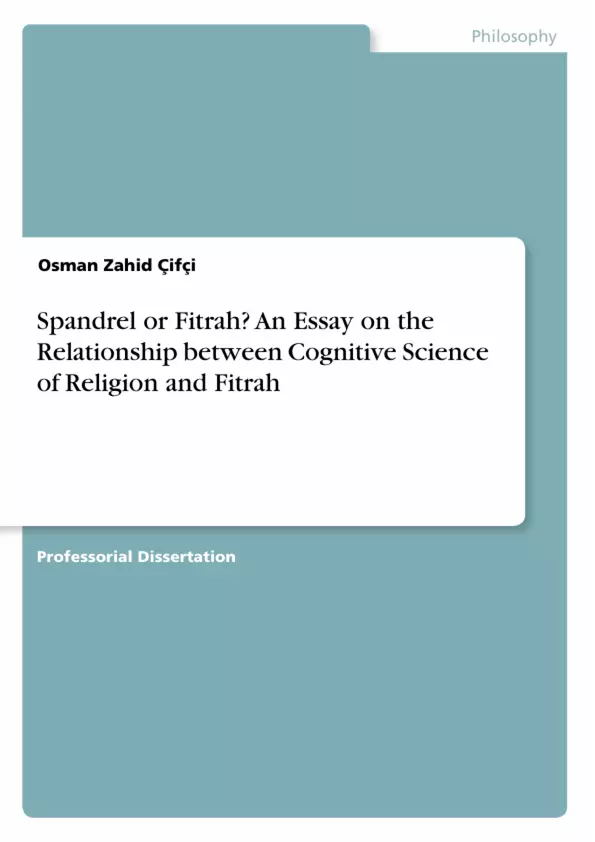
Spandrel or Fitrah? An Essay on the Relationship between Cognitive Science of Religion and Fitrah
Habilitationsschrift, 2023
98 Seiten, Note: 1,0
Philosophie - Theoretische (Erkenntnis, Wissenschaft, Logik, Sprache)
Leseprobe
Inhaltsverzeichnis (Table of Contents)
- Preface
Zielsetzung und Themenschwerpunkte (Objectives and Key Themes)
The main objective of this essay is to explore the relationship between the Cognitive Science of Religion (CSR) and the concept of "fitrah," contrasting it with the "spandrel" theory. The study investigates whether innate human faculties predisposing belief and morality are a result of evolutionary adaptation (spandrel) or a divine gift ("fitrah").
- Cognitive Science of Religion (CSR)
- The concept of "fitrah"
- The "spandrel" theory in evolutionary biology
- Thomas Reid's Commonsense Principles and their epistemological implications
- The inherent human propensity for belief in the supernatural
Zusammenfassung der Kapitel (Chapter Summaries)
Preface: This preface introduces the core question of the essay: whether innate human faculties related to belief and morality are best explained by the evolutionary concept of "spandrel" or the theological concept of "fitrah." It highlights the differing perspectives on the origin of these faculties and outlines the study's approach. The study will first examine the experimental studies and general ideas of the Cognitive Science of Religion (CSR) and then connect these to Thomas Reid’s epistemological views and the concept of “fitrah.” The author explains his motivation for the study, stemming from a recognition of the universality of belief in supernatural powers throughout human history and his observation of the compatibility between "fitrah" and CSR. The expanded scope from an article to a book is also mentioned, along with acknowledgments to the author's wife and editor.
Schlüsselwörter (Keywords)
Philosophy of Religion, Evolution, Cognitive Science of Religion, Spandrel, Fitrah, Innate Faculties, Belief, Morality, Thomas Reid, Commonsense Principles, Epistemology.
Frequently Asked Questions: A Comprehensive Language Preview
What is the main topic of this essay?
The essay explores the relationship between the Cognitive Science of Religion (CSR) and the concept of "fitrah," comparing it to the "spandrel" theory. It investigates whether innate human faculties predisposing belief and morality are a result of evolutionary adaptation or a divine gift.
What are the key themes explored in this essay?
Key themes include the Cognitive Science of Religion (CSR), the concept of "fitrah," the "spandrel" theory in evolutionary biology, Thomas Reid's Commonsense Principles and their epistemological implications, and the inherent human propensity for belief in the supernatural.
What is the objective of this essay?
The main objective is to analyze whether innate human faculties related to belief and morality are better explained by evolutionary theory ("spandrel") or by the theological concept of "fitrah."
What is the "fitrah" concept?
The essay examines "fitrah" as a theological concept representing a divine gift or innate predisposition towards belief and morality, contrasting it with the evolutionary explanation.
What is the "spandrel" theory?
The "spandrel" theory, borrowed from evolutionary biology, proposes that certain traits, including those related to belief and morality, might be byproducts of evolutionary processes rather than direct adaptations.
What is the role of Thomas Reid's philosophy?
Thomas Reid's Commonsense Principles and their epistemological implications are explored in relation to the inherent human propensity for belief and morality, providing a philosophical framework for the discussion.
What does the preface include?
The preface introduces the central research question, highlighting the contrasting perspectives on the origin of innate faculties related to belief and morality ("fitrah" vs. "spandrel"). It also outlines the essay's approach, motivation, and scope.
What are the chapter summaries provided?
The provided HTML includes a summary of the preface, introducing the core question and outlining the essay's approach. Summaries of other chapters are not included in this preview.
What are the keywords associated with this essay?
Keywords include Philosophy of Religion, Evolution, Cognitive Science of Religion, Spandrel, Fitrah, Innate Faculties, Belief, Morality, Thomas Reid, Commonsense Principles, and Epistemology.
Details
- Titel
- Spandrel or Fitrah? An Essay on the Relationship between Cognitive Science of Religion and Fitrah
- Hochschule
- Selçuk Üniversitesi (Faculty of Islamic Studies)
- Veranstaltung
- philosophy and religious studies
- Note
- 1,0
- Autor
- Osman Zahid Çifçi (Autor:in)
- Erscheinungsjahr
- 2023
- Seiten
- 98
- Katalognummer
- V1330560
- ISBN (Buch)
- 9783346840479
- Sprache
- Englisch
- Schlagworte
- Philosophy of Religion Evolution Cognitive Science of Religion Spandrel Fitrah.
- Produktsicherheit
- GRIN Publishing GmbH
- Preis (Ebook)
- US$ 38,99
- Preis (Book)
- US$ 49,99
- Arbeit zitieren
- Osman Zahid Çifçi (Autor:in), 2023, Spandrel or Fitrah? An Essay on the Relationship between Cognitive Science of Religion and Fitrah, München, Page::Imprint:: GRINVerlagOHG, https://www.diplomarbeiten24.de/document/1330560
- Autor werden
- Ihre Optionen
- Vertriebskanäle
- Premium Services
- Autorenprofil
- Textarten und Formate
- Services für Verlage, Hochschulen, Unternehmen

- © GRIN Publishing GmbH.
- Alle Inhalte urheberrechtlich geschützt. Kopieren und verbreiten untersagt.
- info@grin.com
- AGB
- Open Publishing
Der GRIN Verlag hat sich seit 1998 auf die Veröffentlichung akademischer eBooks und Bücher spezialisiert. Der GRIN Verlag steht damit als erstes Unternehmen für User Generated Quality Content. Die Verlagsseiten GRIN.com, Hausarbeiten.de und Diplomarbeiten24 bieten für Hochschullehrer, Absolventen und Studenten die ideale Plattform, wissenschaftliche Texte wie Hausarbeiten, Referate, Bachelorarbeiten, Masterarbeiten, Diplomarbeiten, Dissertationen und wissenschaftliche Aufsätze einem breiten Publikum zu präsentieren.
Kostenfreie Veröffentlichung: Hausarbeit, Bachelorarbeit, Diplomarbeit, Dissertation, Masterarbeit, Interpretation oder Referat jetzt veröffentlichen!
- GRIN Verlag GmbH
-
- Nymphenburger Str. 86
- 80636
- Munich, Deutschland
- +49 89-550559-0
- +49 89-550559-10
- info@grin.com
-









